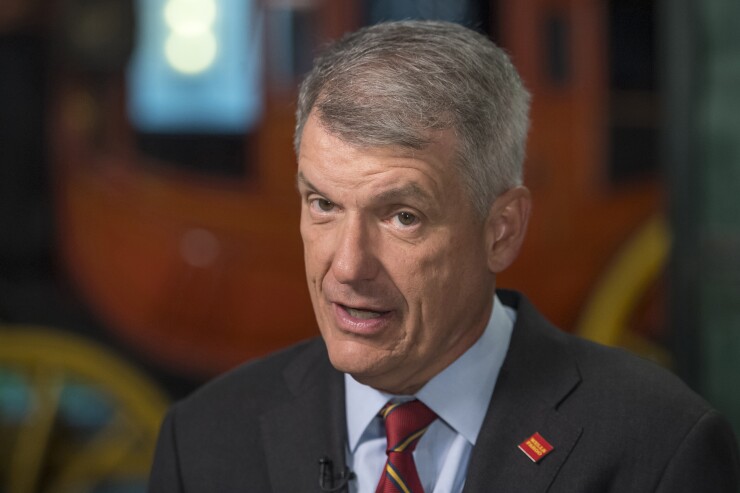Big-bank CEOs are counting on growth on the retail side of the business — from credit cards to mortgages — to help lift them out of the funk in commercial lending.
Asked Thursday about where they see opportunities for consumer loan growth, the heads of several big banks including Wells Fargo and SunTrust sounded unabashedly optimistic.
“Gosh, everywhere,” said Tim Sloan, Wells’ president and CEO.
Sloan said the San Francisco company — which is still reeling from the fallout of the phony-accounts scandal — is making a push to market its credit cards beyond its primary customer base. Increasing referrals of high-net-worth clients from the branch network to the wealth management unit is also a priority.

Additionally, Wells is looking to capture a larger share of the mortgage market, despite having scaled back in recent years on reverse mortgages and other higher-risk home-loan products, according to Sloan. During the first quarter, its average balances for first consumer mortgages held steady from a year earlier, at about $275 billion.
“I think our mortgage business today is as well positioned as it ever has been to take advantage of what we believe is going to be a slow but steady increase in demand for residential mortgages,” Sloan said.
The comments at the Bernstein Strategic Decisions conference in New York coincide with a bleak outlook for business lending.

During investor presentations at a Deutsche Bank conference Wednesday, executives from
Weekly data from the Federal Reserve suggests that the recent deceleration in commercial lending has continued
Commercial loan growth for the 25 largest banks in May was just under 4%, compared with about 12% a year earlier, according to an analysis of the Fed’s weekly loan data from Keefe, Bruyette & Woods.
For the $205 billion-asset SunTrust, Chairman and CEO Bill Rogers said that while loan pipelines remain strong, the post-election optimism among midsize businesses has not yet translated into increased borrowing activity.

Like many of his peers, however, Rogers suggested that consumer lending may be a much-needed bright spot.
Rogers pointed, in particular, to SunTrust’s online lending platform, LightStream, which provides unsecured consumer loans between $5,000 and $100,000. The platform has helped the Atlanta company attract borrowers with sterling credit histories, according to Rogers.
“What it is, is just relevance — that’s really how clients want to do lending,” Rogers said. “When I grew up, traditionally deposits were the entry point into the banking system. I think that’s almost turned upside down. Lending is almost a stronger vehicle to a relationship.”
Additionally, SunTrust wants to beef up business in credit cards, which it primarily markets to its existing customer base. Overall, consumer loans at the company grew 16% during the first quarter, to $26.3 billion.
PNC Financial Services Group is also making a push to market its credit cards to primary customers — an approach that, until the Wells fiasco, was often referred to as cross-selling.
During a presentation Wednesday, CEO Bill Demchak said that the $360 billion-asset PNC wants to increase its credit card penetration rate from its current level of about 25%. Many of the Pittsburgh company’s peers are at roughly 35%, he said.
“We just want to get people who are already customers to use products,” Demchak said.
For Wells, generating growth on the retail side of the business will likely be an uphill battle after the fake-accounts scandal. The company agreed in September to pay about $190 million to settle charges that more than 5,000 employees opened roughly 2 million unauthorized customer accounts.
The scandal has hurt Wells' reputation and retail banking business. During March, new checking accounts plunged 35% to about 600,000, the company said during its first-quarter earnings call. Branch banker interactions fell 14%.
Sloan was upfront about the challenges facing Wells’ consumer business as the company tries to salvage its once-marquee brand.
Still, he said efforts to build up credit card acquisitions and expand wealth management offerings — including by launching a robo-advisory service in the second half of the year — will help put Wells’ consumer business back on track.
“There [are] a lot of really good opportunities across the entire retail business,” Sloan said.





